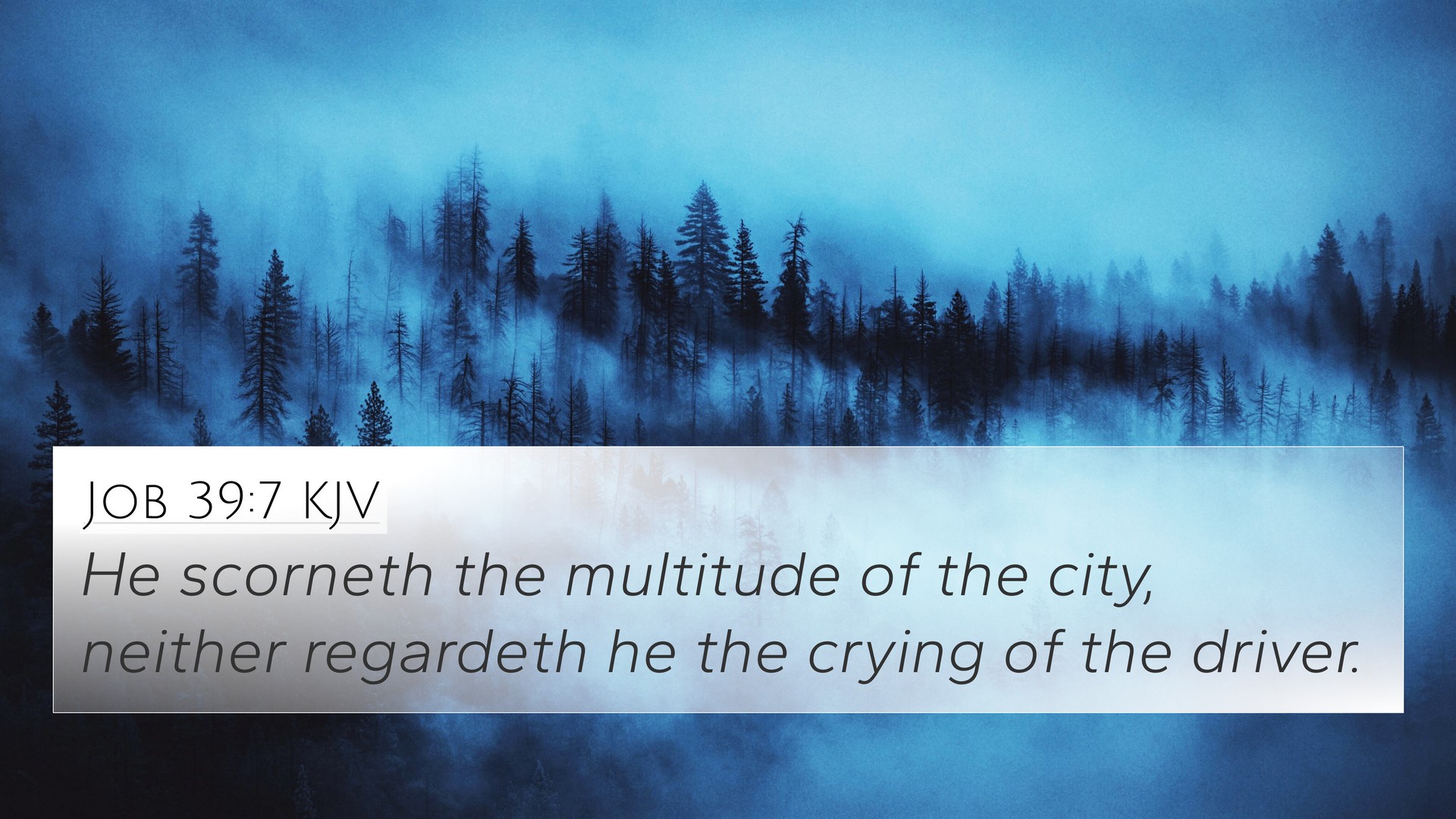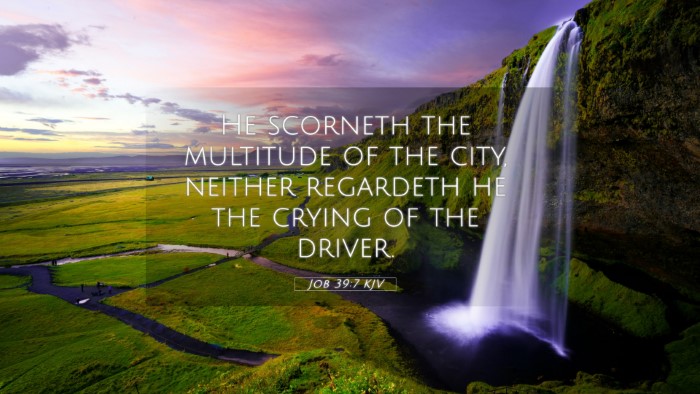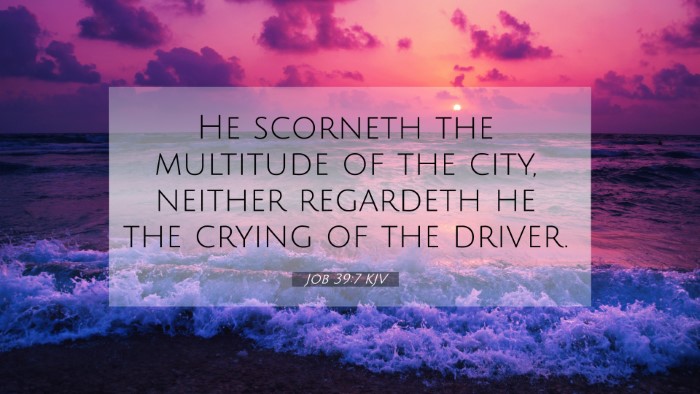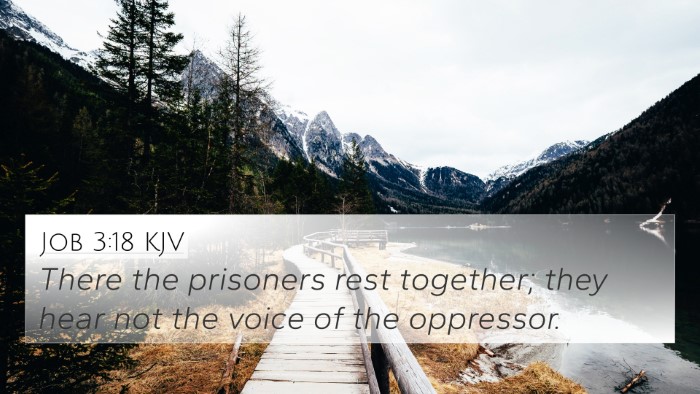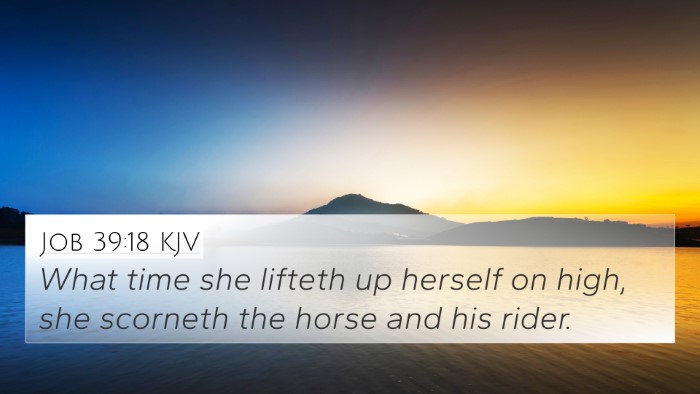Old Testament
Genesis Exodus Leviticus Numbers Deuteronomy Joshua Judges Ruth 1 Samuel 2 Samuel 1 Kings 2 Kings 1 Chronicles 2 Chronicles Ezra Nehemiah Esther Job Psalms Proverbs Ecclesiastes Song of Solomon Isaiah Jeremiah Lamentations Ezekiel Daniel Hosea Joel Amos Obadiah Jonah Micah Nahum Habakkuk Zephaniah Haggai Zechariah MalachiJob 39:7 Similar Verses
Job 39:7 Cross References
He scorneth the multitude of the city, neither regardeth he the crying of the driver.
Uncover the Rich Themes and Topics of This Bible Verse
Listed below are the Bible themes associated with Job 39:7. We invite you to explore each theme to gain deeper insights into the Scriptures.
Job 39:7 Cross Reference Verses
This section features a detailed cross-reference designed to enrich your understanding of the Scriptures. Below, you will find carefully selected verses that echo the themes and teachings related to Job 39:7 KJV. Click on any image to explore detailed analyses of related Bible verses and uncover deeper theological insights.
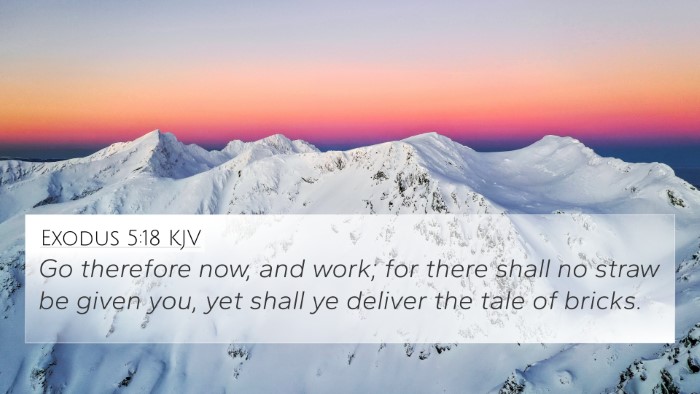
Exodus 5:18 (KJV) »
Go therefore now, and work; for there shall no straw be given you, yet shall ye deliver the tale of bricks.

Exodus 5:13 (KJV) »
And the taskmasters hasted them, saying, Fulfil your works, your daily tasks, as when there was straw.
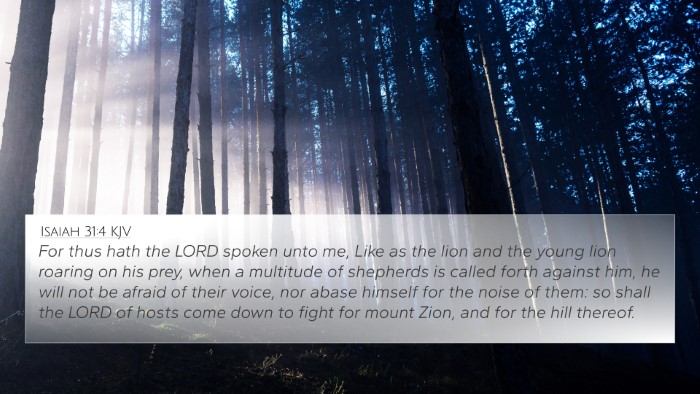
Isaiah 31:4 (KJV) »
For thus hath the LORD spoken unto me, Like as the lion and the young lion roaring on his prey, when a multitude of shepherds is called forth against him, he will not be afraid of their voice, nor abase himself for the noise of them: so shall the LORD of hosts come down to fight for mount Zion, and for the hill thereof.
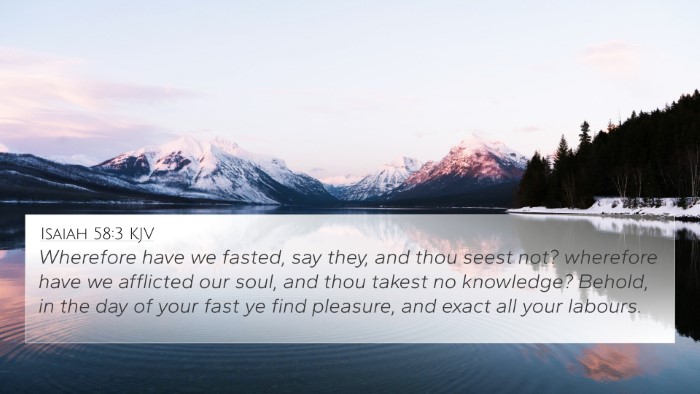
Isaiah 58:3 (KJV) »
Wherefore have we fasted, say they, and thou seest not? wherefore have we afflicted our soul, and thou takest no knowledge? Behold, in the day of your fast ye find pleasure, and exact all your labours.
Job 39:7 Verse Analysis and Similar Verses
Understanding Job 39:7
Job 39:7 states: "He scorneth the multitude of the city, neither regardeth he the cry of the driver." This verse is part of God’s discourse to Job, focusing on the majesty of creation and the sovereignty of God over all creatures. The passage emphasizes the powerful and independent nature of the ostrich, symbolizing how certain beings in the natural world operate beyond human understanding and influence.
Verse Meaning and Analysis
The wise creator is depicted in this verse, showcasing various animals' behaviors, including the ostrich who disregards the commotion around it. In this, several insights converge:
- Majesty of Creation: The verse highlights God's power and authority over creation. The ostrich, with its unique behavior, serves as a reminder of the complexity of God's creations.
- Human Limitations: It illustrates how creatures do not operate solely based on human expectations or emotions, indicating a broader divine plan at work.
- Indifference vs. Sovereignty: The ostrich's perceived indifference to the city’s multitude and the driver’s cry symbolizes perhaps the theme of divine detachment; God’s ways are higher than our ways, emphasizing trust in His plans.
Cross-References
This verse connects with several other scriptural passages that enhance its meaning:
- Isaiah 55:8-9: "For my thoughts are not your thoughts, neither are your ways my ways, saith the Lord." This underscores the idea that God's intentions and movement in the world exceed human understanding.
- Psalms 104:25-26: "So is this great and wide sea, wherein are things creeping innumerable, both small and great beasts." This can be compared to God's creation's vastness and complexity.
- Proverbs 30:29-31: "There be three things which go well, yea, four are comely in going: a lion which is strongest among beasts, and turneth not away for any." This connects with the theme of the strength and independence of creatures.
- Ecclesiastes 3:1: "To every thing there is a season, and a time to every purpose under the heaven." Represents God's timing and purpose for all beings.
- Matthew 6:26: "Behold the fowls of the air: for they sow not, neither do they reap, nor gather into barns; yet your heavenly Father feedeth them." Reflects God's concern even for the creatures thought to be indifferent.
- Romans 11:33: "O the depth of the riches both of the wisdom and knowledge of God! How unsearchable are his judgments, and his ways past finding out!" This emphasizes the ungraspable nature of God's design.
- Lamentations 3:34-36: "To crush under his feet all the prisoners of the earth, to turn aside the right of a man before the face of the most High, to subvert a man in his cause, the Lord approveth not." Discusses the nature of justice and God's authority.
Connections Across Scripture
This verse invites deeper exploration into the themes of creation and divine sovereignty found throughout the Bible. Understanding Job 39:7 involves recognizing these themes in various contexts:
Thematic Connections:
Creation and Sovereignty: Job 39:7 resonates with the concepts found in passages focusing on God's creation and the way He orchestrates events in the world.
Biblical Cross-Reference Techniques
To utilize cross-referencing in your biblical studies effectively:
- Use a Bible Concordance to find related scriptures.
- Engage in Comparative Bible Verse Analysis to draw thematic connections.
- Implement a Bible Cross-Reference Guide during study sessions.
- Identify Links between the Prophets and Apostolic Teachings for deeper insights.
Exploring Scripture's Depth
Connecting verses through cross-referencing prepares readers for deeper biblical engagement. By tracing themes like divine sovereignty, independence in creation, and the limitations of human understanding, one navigates the Bible’s rich theological landscape.
Conclusion
Job 39:7 teaches us about God's majestic design in creation and our role in understanding it. As individuals delve into scripture, the use of cross-referencing becomes an invaluable tool for uncovering the interconnectedness of God’s Word and His divine purpose.
